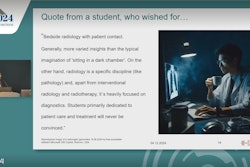
An online elective course can effectively educate radiology students on the concept of appropriateness in medical imaging, according to an Israeli study published July 18 in Academic Radiology.
Researchers led by Samuel Francis from Ben Gurion University of the Negev in Be'er Sheva found that exam scores on an evaluation taken from the American College of Radiology (ACR) appropriateness criteria improved significantly compared to previously published scores of students who took such assessments without taking a radiology course.
"We hope that this course can help overcome the lack of awareness and utilization of the ACR appropriateness criteria and other imaging appropriateness resources among student, resident, and attending physicians," the Francis team wrote.
Without standardized learning objectives, radiology education can vary among institutions. This means "many" physicians and student doctors are unprepared to make appropriate choices for imaging, the researchers suggested.
The COVID-19 pandemic necessitated the use of virtual learning platforms for students to continue their education. Francis and colleagues created a fully online, image-intensive radiology curriculum that introduces students to clinical radiology, as well as the use of appropriate imaging.
The elective curriculum takes place over the course of two weeks and is free for students to take. Students cobbled together an elective portfolio that consists of self-assessments. They also prepared a clinical radiology conference to present as a radiologist in training. From there, they completed two final assessments: clinical vignettes based on the ACR appropriateness criteria and an MRI safety quiz.
For the study, Francis and colleagues wanted to assess the curriculum's efficacy in introducing third- and fourth-year students to appropriate imaging usage. They reported that five different institutions had at least five students who completed the course. In total, scores from 97 students were entered into the analysis.
The researchers also compared the students' scores to all three examination groups in a reference study. These included a control group (students who did not complete the imaging appropriateness module), a pretest group (students who took a baseline exam before completing the module), and a posttest group (the same group of students from the pretest group, but who also took an exam after completing the module.)
The team found that the students had an average score of 74.3% and a standard deviation of 12.98%. They also found that scores improved significantly over those of students from the reference study who had not taken an imaging appropriateness module. The control group had an average score of 57.1% (p < 0.001) and the pretest group on average scored 63.1% (p < 0.001). However, the posttest group had a higher score at 79.1% (p = 0.016).
"Furthermore, the referenced articles showed no significant difference between the various years of residency, suggesting that the lack of understanding is not overcome with more nonspecific training," the study authors wrote.
The team published the course as a resource on a distribution list for physician educators and shared upon request with over 50 medical schools around the world. The ACR also helped collate and edit the course's design.
The researchers also reported that the course was posted onto the ACR Medical Student Informational Hub and has been accessed over 13,000 times. They highlighted that it has been adopted into official electives at two additional medical schools and is recommended by "many" other schools as optional electives.
"We have continued to offer the elective after the removal of COVID restrictions and it has continued to be successful and popular," the authors wrote.
The study can be found in its entirety here.




















